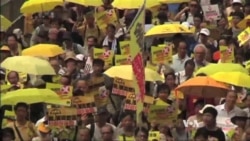After Hong Kong’s landmark vote on electoral reform, activists on both sides of the controversial proposal are plotting next steps.
After months of mass public protests, this week Hong Kong’s legislature vetoed Beijing’s proposal for electoral reform, calling it a plan for “fake” democracy and universal suffrage. Twenty-eight lawmakers voted against the plan, and only eight legislators voted in support after dozens of pro-Beijing lawmakers left the Legislative Council chambers just as the vote got underway.
The veto, which was expected, has set the stage for continued debate over Hong Kong’s future.
“Of course we have to continue with the struggle," said Emily Lau, chair of Hong Kong’s Democratic Party. "This is a sad day for Hong Kong and many people in Hong Kong are very angry for various reasons. And it is very sad, so the struggle in Hong Kong must continue.”
Beijing had proposed that nominees for the city’s chief executive be chosen by a 1,200-member committee, which opponents of the plan say is filled with business leaders and Beijing loyalists. The proposal spurred 100,000 democracy activists to fill Hong Kong’s streets last fall, demanding direct elections of the city’s leader.
Political parties are already gearing up for the next battle – district elections this November.
“We have the district council elections in November of this year, then we have the legislative council elections in September of next year," said Joseph Cheng, a democracy activist and Professor at the City University of Hong Kong. "The strategy on the part of the government, on the part of the establishment, seems to be to discredit the pro-democracy camp for vetoeing the bill and to try to snatch as many seats from them as possible in the two elections."
Some activists worry the impasse on the electoral reform plan will result in lost seats for pan-democrats in the upcoming elections, making progress on democratic reforms harder within the legislative chamber. Now that the Beijing proposal has been vetoed, Hong Kong will maintain its current electoral process of the city’s chief executive being chosen by committee.
The next election for Hong Kong’s leader is just two years away – in 2017.









